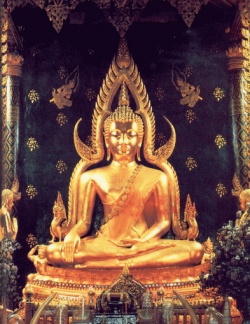Baka Brahmā
Baka Brahmā (literally "crane-Brahmā") appears in theMajjhima Nikaya, where he is a deity who believes that his world is permanent and without decay (and that therefore he is immortal), and that therefore there are no higher worlds than his. The Buddha refutes Baka's claims, relating the concept of anitya or impermanence, but one of Baka's attendants (influenced by Māra) asserts that Baka Brahmā is the Creator, that those who praise him will be rewarded, but those who deny his powers will be terribly punished. The Buddha identifies the real speaker as Māra, and states that he is free of his power.
Baka Brahmā then states that it is futile to escape his domain (which he imagines to be universal), and points out that if the Buddha depends upon any of the things within Baka's cognizance, he will be within his realm, and Baka Brahmā can act upon him as he sees fit. The Buddha responds that Baka Brahmā does have this much power, but that there are realms which Baka Brahmā knows nothing of, and that the Buddha's knowledge places him beyond Baka's power. Baka Brahmā is at last convinced by a display of the Buddha's superior magical power and his ability to explain his present situation by reference to his past lives.
Baka Brahmā was in a past life a human ascetic named Kesava; by various means he saved many people from destruction. For his meditative prowess he was born as a Bṛhatphala deva, and in successive rebirths gradually sank through the levels of the Rūpadhātu until he became an ordinary Brahmā.
On another occasion, Baka Brahmā believes that no monk or ascetic can enter his world (through supramundane powers of manifestation), but the Buddha himself and several of his disciples visit him to prove him wrong.
Baka Brahma appears in the Bakabrahma-sutta and the Brahmanimantanika-sutta.
